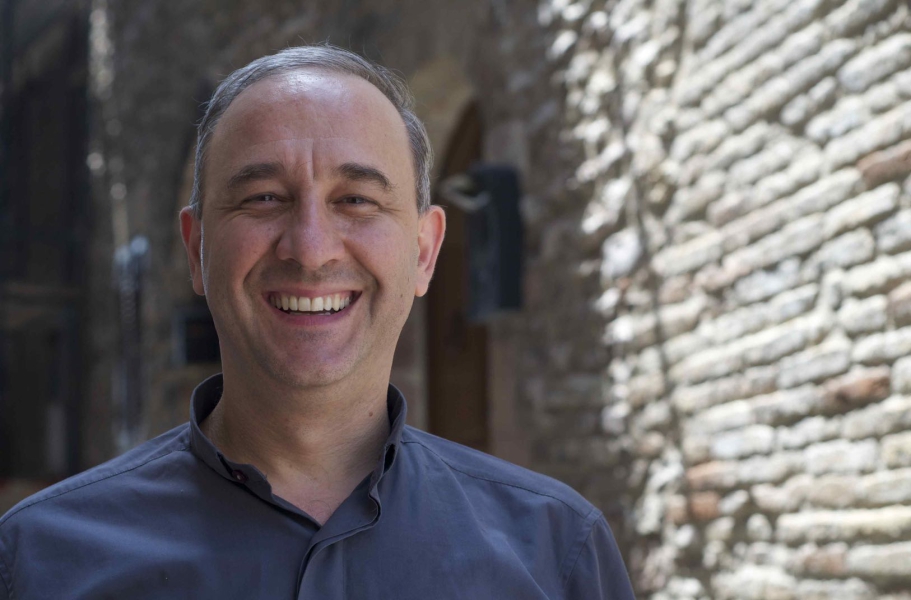
Michele Ferrero, an Italian sinologist at Beijing Foreign Studies University
Italian sinologist Dr. Michele Ferrero has taught Latin and Western classics at Beijing Foreign Studies University (BFSU) for the past 10 years. Like everyone else, he is operating under difficulties at this special time. But these trials have at least introduced him to “live streaming” — one of China’s hottest media trends.
“About two weeks ago I found myself stranded in Hong Kong after failing to return to Italy. I was so relieved, not to mention immensely grateful, when the dean of my department and the BFSU authorities were eventually able to bring me back to Beijing,” Ferrero told China Today.
Reinstalled in his Beijing apartment, which is now fully equipped to facilitate his modified teaching mode, Ferraro presents regular online courses to his students via live streaming.
Although the past month or more has been hard on residents, locals and expats alike, in China, his Chinese friends and colleagues’ gestures of friendship and thoughtfulness have moved and reassured Professor Ferrero.
“I'm genuinely touched by the many good wishes and offers of support from my Chinese friends and colleagues. School leaders and faculty have brought me food throughout this period of self-quarantine, and even gone out of their way to buy pasta so that I could cook Italian dishes here during the epidemic period,” Ferrero said.
Live Streaming Fresher
With the help of two assistants, Ferrero now makes regular live streaming appearances. “Although multimedia teaching aids are nothing new to me, giving classes through zhibo (live streaming) systems is truly a novel experience. I and my colleagues are all students in that respect,” Ferrero said.
Dr. Ferrero is deeply impressed with the way the Chinese people is managing to bring their life back to normalcy and tiding over the difficult times. “It's amazing how, in spite of all the problems generated by the coronavirus, regular classes are now conducted throughout China. This is a huge, highly commendable achievement. It stands as an example of the Chinese people's calm efficiency in the face of a global emergency," Ferrero said.
The professor and his students are nevertheless looking forward to the day when they can finally go back on campus. “In a regular class, you can ask for a show of hands from anyone who wants to answer a question and see the others’ reaction. When teaching an online class you hear different voices, so you need to ask for answers to questions one at a time while muting the microphones of other students. As these minor technical details alter the flow of interaction, these classes are inevitably less spontaneous and animated than ‘live’ ones,” Professor Ferrero admitted. He also misses chatting with students before and after on-campus classes, and his students feel the same. “All my students say they miss being on campus,” he said. That’s why everyone’s fingers are crossed that the epidemic will soon end.
Ever-lasting China-Italy Friendship
Many of Ferraro’s Chinese friends and students showed deep concern for Ferrero’s family when the epidemic began to engulf Italy, and all offered their support. He finds these gestures of friendship both moving and gratifying.
Ferrero believes that China’s strict control over public mobility has been highly effective. “I think we’re doing the same in Italy as is practiced in China. People stay at home to reduce contact with and so reduce the risk of infection from others. This is crucial,” he said. Also, like China, Italy is cutting back on all but the most urgent medical treatment and services in hospitals, in order to make the optimum amount of facilities and healthcare workers available to deal with COVID-19 patients, Ferrero said.
As China was the first country to deal with this epidemic emergency, in view of the impressive results it has achieved, “Italy is in a way learning from China’s experience,” Ferrero said.
Despite the still grim domestic situation, China is now sending medical workers to Italy. This, to Ferrero, signifies even better prospects for China and Italy’s long-lasting friendship.
For Professor Ferraro, many facets of Chinese culture have perennial charm, particularly the traditions embodied in people’s daily lives. “The traditional manner in which people relate to each other socially is both complex and studied. This, to me, signifies a great deal about China and its people,” Ferrero said.